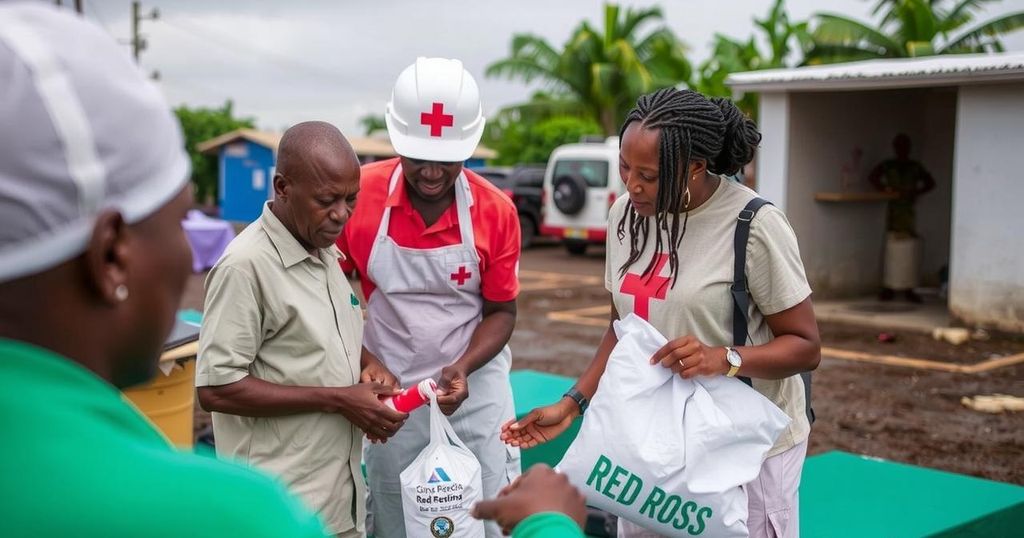Cyclone Chido has caused extensive damage across Mozambique and surrounding regions, affecting over 622,000 individuals and destroying thousands of homes. The IFRC has launched an Emergency Appeal to provide immediate relief and strengthen community preparedness for future storms, aiming to raise 10 million Swiss francs to assist 100,000 people across impacted nations.
As the South-West Indian Ocean tropical cyclone season commences, Cyclone Chido has inflicted significant destruction across Mozambique and other neighboring regions since its landfall on December 15. The cyclone’s impact spanned multiple countries including Madagascar, Comoros, and Malawi, with heavy rainfall and severe winds leading to loss of life and widespread damage to infrastructures such as homes, roads, and communication pathways. Thousands have been displaced as they grapple with the aftermath of this natural disaster.
According to Naemi Heita, Head of the International Federation of Red Cross and Red Crescent Societies (IFRC) Country Cluster Delegation for Mozambique and Angola, assessments are ongoing to evaluate the full scope of the damage. The emerging needs of the affected individuals encompass essential resources such as shelter, food, clean drinking water, and healthcare services. These needs are expected to escalate as emergency responders gain access to regions previously isolated by flooding and destruction.
Preliminary reports indicate that nearly 622,000 individuals in Mozambique alone have been affected by Cyclone Chido, with approximately 130,000 shelters either damaged or completely destroyed. Neighboring Comoros has also faced devastation, with over 64,000 individuals affected, while in Malawi, more than 45,000 have suffered due to the cyclone. Furthermore, in Mayotte, about 70% of the population is impacted, resulting in the destruction of over 35,000 homes. Red Cross teams are actively engaged in rescue operations and providing support to these hard-hit communities.
To address the catastrophic consequences of Cyclone Chido, the IFRC has initiated an Emergency Appeal aiming to garner 10 million Swiss francs to assist 100,000 individuals across Mozambique, Madagascar, Comoros, and Malawi. This comprehensive response plan focuses on integrated support strategies that include the distribution of cash, shelter, and healthcare. Key initiatives encompass the provision of essential household items, cash transfers, water and sanitation services, and the implementation of protective measures for vulnerable populations.
In addition to immediate assistance, the Emergency Appeal emphasizes enhancing community preparedness for future cyclones, targeting 500,000 individuals in high-risk areas. Planned efforts include the improvement of early warning systems, pre-positioning emergency resources, and training of volunteers in disaster response and preparedness protocols.
Cyclone Chido has emerged as a grave threat during the ongoing tropical cyclone season in the South-West Indian Ocean. Its landfall in Mozambique has resulted in dire humanitarian needs, affecting hundreds of thousands across several countries. The complexity of the disaster necessitates coordinated international assistance efforts to mitigate the immediate impacts and prepare for future storms, especially in light of forecasts indicating an above-average cyclone season. The Red Cross and IFRC play significant roles in the response, focusing on relief and long-term community preparedness.
In conclusion, Cyclone Chido has had a devastating impact on several countries in the South-West Indian Ocean region, displacing thousands and severely affecting essential infrastructures. The Red Cross, through the IFRC’s Emergency Appeal, strives to provide immediate aid while enhancing community readiness for future cyclones. As the assessments continue, the international community must rally to support those affected and strengthen resilience against such natural disasters in the future.
Original Source: reliefweb.int






